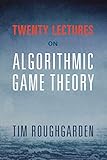Twenty lectures on algorithmic game theory
Material type: TextPublication details: Cambridge Cambridge University Press 2016 Description: xiii, 341 pISBN: 9781316624791Subject(s): Algorithms | Game theoryDDC classification: 519.3 Summary: Computer science and economics have engaged in a lively interaction over the past fifteen years, resulting in the new field of algorithmic game theory. Many problems that are central to modern computer science, ranging from resource allocation in large networks to online advertising, involve interactions between multiple self-interested parties. Economics and game theory offer a host of useful models and definitions to reason about such problems. The flow of ideas also travels in the other direction, and concepts from computer science are increasingly important in economics. This book grew out of the author's Stanford University course on algorithmic game theory, and aims to give students and other newcomers a quick and accessible introduction to many of the most important concepts in the field. The book also includes case studies on online advertising, wireless spectrum auctions, kidney exchange, and network management.
TextPublication details: Cambridge Cambridge University Press 2016 Description: xiii, 341 pISBN: 9781316624791Subject(s): Algorithms | Game theoryDDC classification: 519.3 Summary: Computer science and economics have engaged in a lively interaction over the past fifteen years, resulting in the new field of algorithmic game theory. Many problems that are central to modern computer science, ranging from resource allocation in large networks to online advertising, involve interactions between multiple self-interested parties. Economics and game theory offer a host of useful models and definitions to reason about such problems. The flow of ideas also travels in the other direction, and concepts from computer science are increasingly important in economics. This book grew out of the author's Stanford University course on algorithmic game theory, and aims to give students and other newcomers a quick and accessible introduction to many of the most important concepts in the field. The book also includes case studies on online advertising, wireless spectrum auctions, kidney exchange, and network management.
| Item type | Current library | Collection | Call number | Copy number | Status | Date due | Barcode |
|---|---|---|---|---|---|---|---|
 Book
Book
|
Indian Institute of Management LRC General Stacks | Operations Management & Quantitative Techniques | 519.3 ROU (Browse shelf(Opens below)) | 1 | Available | 000599 |
Table of Contents
1. Introduction and examples
2. Mechanism design basics
3. Myerson's Lemma
4. Algorithmic mechanism design 34
5. Revenue-maximizing auctions
6. Simple near-optimal auctions
7. Multi-parameter mechanism design
8. Spectrum auctions
9. Mechanism design with payment constraints
10. Kidney exchange and stable matching
11. Selfish routing and the price of anarchy
12. Network over-provisioning and atomic selfish routing
13. Equilibria: definitions, examples, and existence
14. Robust price-of-anarchy bounds in smooth games
15. Best-case and strong Nash equilibria
16. Best-response dynamics
17. No-regret dynamics
18. Swap regret and the Minimax theorem
19. Pure Nash equilibria and PLS-completeness
20. Mixed Nash equilibria and PPAD-completeness.
Computer science and economics have engaged in a lively interaction over the past fifteen years, resulting in the new field of algorithmic game theory. Many problems that are central to modern computer science, ranging from resource allocation in large networks to online advertising, involve interactions between multiple self-interested parties. Economics and game theory offer a host of useful models and definitions to reason about such problems. The flow of ideas also travels in the other direction, and concepts from computer science are increasingly important in economics. This book grew out of the author's Stanford University course on algorithmic game theory, and aims to give students and other newcomers a quick and accessible introduction to many of the most important concepts in the field. The book also includes case studies on online advertising, wireless spectrum auctions, kidney exchange, and network management.

There are no comments on this title.